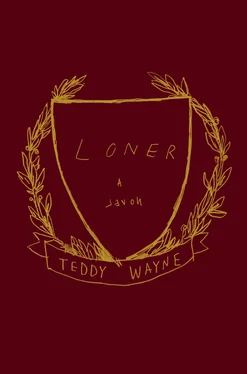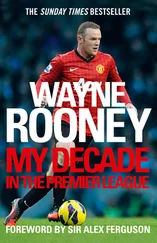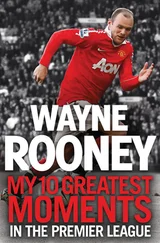A cab to New Jersey would be exorbitant, and I’d have to wake my parents up and ask them to come downstairs and pay for it, with me drunk and disheveled. My return ticket granted me the privilege of staying overnight in the station. I sat against a wall, not letting myself nod off for fear of the indigent drifters who were also taking refuge there, waves of rage and nausea cresting in alternation, the swelling of one temporarily abating the other. As I scrutinized your Facebook page for any hints of where you’d gone, my phone died, leaving me with nothing but my acid thoughts for five hours.
I took the first train in the morning and walked an hour home from the station. “Taking a nap before my bus,” I called to my parents in the kitchen.
“Sounds like someone had a big night out in the city,” my mother said.
I got in bed, plugging in my phone and checking my e-mail. One new message, sent a few hours after my phone had died.
Just got email. Friend had emergency. Had to leave.
I responded:
No problem! I gave your drinks to my friends. We had a fun night. Hope your friend’s okay.
I nestled into my pillow but, despite my exhaustion, couldn’t fall asleep, buzzed on the welcome relief of knowing you hadn’t intentionally abandoned me, even feeling a little foolish for my premature, unwarranted fury. Of course there’d been a reason.
Following Thanksgiving vacation, we had a truncated week of classes, then reading period, then exams. I showed up early to the final lecture of Prufrock. Tom was at his usual post near the back. Had you not gone to the Ad Board as you’d claimed? No; he was either still unaware of the imminent charges or in denial, assuming it would blow over.
Further confirming this, you were already there for once, in the front row, to keep your distance from him. I dropped my bag in the seat next to yours and strode up to the podium, where Samuelson was reviewing his notes. I hadn’t heard back when I e-mailed him “I’m Nobody! Who Are You?: The Self as Staffage in Emily Dickinson,” so I’d printed out a hard copy. “In case this got lost in your in-box,” I said, handing it to him.
He held the pages at a distance and lifted his head to read the type through his bifocals. “Your paper?” He tried to give it back to me. “You’re supposed to send this to your section leader.”
“I know,” I said. “I e-mailed it to Harriet, of course. I just thought you might also want to read it, because of last time. It’s not on Hawthorne, but I figured that can wait till next semester.”
Samuelson looked bewildered and a little peeved. “What happened last time?”
“Never mind,” I said, taking the paper from him. I was the one who should have been annoyed. To have cited a student’s essay in class and invited him to office hours, only to forget him altogether, wasn’t just absentminded; it was disrespectful. When I returned to my seat, you were looking at your phone, kindly pretending to be too preoccupied to have registered the failed exchange. Samuelson began, your device vanished, your notebook came out, and you struck a pose of intense concentration that you maintained for the duration of his talk.
“If nothing else,” Samuelson said in his concluding remarks, “I hope I’ve done you all the wonderful service of making you aware of your own tragic flaws.” There was polite laughter and a round of applause.
“So your friend’s okay?” I asked you as the clapping petered out.
You nodded as you packed up but didn’t volunteer any details.
“Glad to hear it,” I said. “My friends showed up right after you left, so I didn’t know if I should give them your drinks, or what. I guess I should’ve explained that in my messages.”
“No worries.” You shouldered your bag and turned toward the aisle.
“I was planning on knocking my final paper out of the way this week,” I said as we waited for the aisle bottleneck to clear. “Want to meet up?”
“I’m pretty busy with other work this week.”
“Next week’s good, too. I’m flexible.”
You took your phone and earbuds out of your bag. “Don’t wait on my account.”
“No, you’re right, I’ve got other finals I should take care of first.”
You untangled the cord.
“So just let me know when you’re ready to meet,” I said.
“Will do.”
“Cool. I’ll wait for you to get in touch.” As we stepped into the hall you put the earbuds in. “One more thing,” I said in a hushed tone, and subtly nodded my head back to the classroom.
Your eyes flitted around us, indicating you knew what I was about to bring up and that we shouldn’t discuss it in the open, especially not with Tom nearby. Your signal was unnecessary: you could trust me not to blurt out anything confidential.
“Do you need any help?” I whispered.
“I’m taking care of it,” you said casually.
“Remember, you can bring me along as a personal advisor. Or if you just need moral support.”
You waited for the group ahead of us to move on. “They actually told me I shouldn’t be discussing it. So the best thing you could do for me is to respect that.”
“Got it.” I nodded. “Well, keep me posted.”
“No, you don’t get it,” you said. “I’m asking you — I’m tell ing you, this conversation is over. I can’t be talking about this with anyone .” You looked straight into my eyes. “Do you read me?”
Od uoy daer em?
“Of course,” I said. “I completely understand.” I bet no one else knew about it, not even Suzanne. Only me.

Reading period commenced a few days later. An unstructured week to study before the rude arrival of finals, its longueurs felt like a never-ending Sunday afternoon. My room was devoid of activity; Steven had begun a codependent relationship with the one female member of his magic club and alighted at home only for changes of clothes. The library was crowded with students who flocked to the communal tables like pigeons to bread crumbs. Even sequestered in the privacy of a carrel, I found it difficult to focus; the floor and walls seemed to vibrate with the buzz of their prattling. I brought my work to Annenberg, where I continued to dine solo, a quarantined patient. The social fluidity of September had frozen into compartmentalized ice cubes; fixed units of freshmen, strangers a short three months ago, now bantered with the glib repartee of news anchors between segments.
I didn’t see you at any meals, but a lot of students were skipping them to prepare for finals.
And so what; I’d have you to myself soon enough, after the last essay had brought us closer together. The others were movie extras, background noise. Pure staffage in our landscape.

One evening Scott Tupper cut ahead of me in line for soda. I let it go, but an hour later, back in my room, I set up a fake e-mail account and wrote an anonymous, scathing character assassination, telling him one of his childhood victims knew where he lived.
I couldn’t find his e-mail address in the student directory. Searching for him on Facebook didn’t turn up anyone in the Harvard network, either. There was a guy with his name associated with the University of Vermont, though. I clicked on the profile.
It was Scott.
He looked similar to the pug-nosed guy at Harvard, just with longish hair. But the real Scott Tupper, as his Facebook page would have you believe, had become a budding left-wing intellectual; his interests included Marx and Noam Chomsky, and all the links he posted were to articles about social justice and the evils of corporate influence.
Читать дальше













